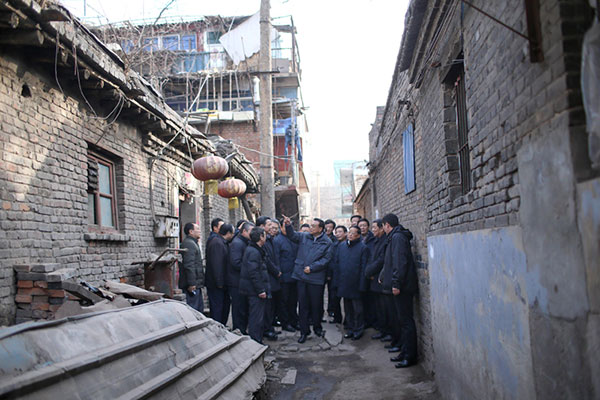
Premier Li Keqiang inspected a shantytown area in Taiyuan, Shanxi province, on Jan 4, 2016. The Premier visited the dilapidated one-story house of an old woman in the Xiaobeiguan area, then heard that there are more than 80 such areas in Taiyuan. “You see? Ordinary people are still living in such conditions. China still has a lot to do!” he said to the ministers accompanying him.
All government departments are now proactively implementing policy measures, as Premier Li Keqiang reiterated at State Council executive meetings, on the importance of hearing the voice of the people, serving the people and carrying out further reforms.
At a State Council executive meeting on June 22, after reading a report regarding the implementation of private investment policies, Premier Li asked the leader of the State Administration for Industry and Commerce why a private company starting a new project has to take so much time and go through 90 administrative approvals in three government departments, given the fact that the three-in-one certificate reform had been carried out.
Ten hours after that meeting, a situation statement by the State Administration for Industry and Commerce was sent to the State Council, saying that data provided by the company dated from before March 2015, while certificate reform was implemented on July 1, 2015.
The State Administration for Industry and Commerce was not the only government department that the Premier had questions for at the State Council executive meetings.
In response to the Premier’s doubt concerning charges on annual inspection of health certificates, the National Health and Family Planning Commission not only submitted a detailed explanation but also made a plan on the future improvement of administrative services. The improvements are aimed at regulating charges on the health certificate annual inspection and reducing the financial burdens on enterprises.
In fact, a “normal mechanism” is forming as the Premier put forward requirements at the State Council executive meetings and department leaders, then carried out active implementation.
At the State Council executive meeting on June 15, the Premier stressed that earnest payments should be regulated in engineering construction sectors. On the second day of the meeting, a report regarding earnest payments across the country was submitted to the State Council. On the same day, the China Railway Corporation also sent a report of earnest payments to the State Council and promised to make efforts to regulate the practice, lower costs for enterprises and create a fair business environment.
At a State Council executive meeting before the two sessions this year, Premier Li asked ministers from all departments to actively respond to public concerns. During the two sessions, the ministers actively responded to the media as they walked down the “minister passage” inside the Great Hall of the People.
The passage is a 100-meter-long red carpet where ministers paused to answer reporters’ questions.
